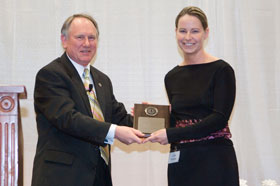  |
| HOME | THIS ISSUE | CALENDAR | GRANTS | BACK ISSUES | < BACK | NEXT > |
Communication sciences TA earns rave reviews from studentsby Karen Singer - November 13, 2006 | ||||
| For Linda Patrylak, teaching means far more than merely following the lesson plan. She likes to "connect personally" with students and encourage them to develop critical thinking skills. "My philosophy involves figuring out how the individuals in the class learn, and providing a comfortable environment where they can talk to me and tell me what is not working," says Patrylak, who won a 2006 Outstanding Teaching Assistant award. She became a teaching assistant in the Department of Communication Sciences five years ago, and currently teaches several courses while completing her Ph.D. "We have a lot of extremely good teachers among our graduate students, but Linda was not just among the best in her cohort, but the best I have seen," says Marina Krcmar, a former associate professor of communication sciences at UConn, who taught Patrylak last fall. "Her progress as a scholar is intimately related to her progress as a teacher . telling students what is coming up and what is new," adds Krcmar. "She has such a positive energy, and I think students are very, very drawn to that." Patrylak's advisor, Mark Hamilton, offers similar praise. "Linda knows all her students' names and she talks to them as individuals," he says. "Some people are just born teachers." A family role model may help, though. "It's my dad's fault I have this teaching bug," Patrylak says, referring to her father, Daniel, an emeritus professor of music at UConn. (Her brother and sister also became teachers.) "I grew up watching my father with students," Patrylak says. "I saw that he listened to them. He valued their opinions. He was patient. And they contacted him years later to say how he influenced them." Teaching wasn't Patrylak's first career choice, however. After earning a bachelor's degree in communication sciences at UConn in 1989, she spent more than a decade in the business world, working for a video store company - eventually as a manager - and later for an art gallery. "What I loved about retail was the training," she says, "the look on that staff member's face when he or she 'got it,' and when they were promoted from a $6-an-hour job to having their own store." By the turn of the millennium, Patrylak became interested in speech language pathology, following her mother's recovery from a stroke, and she returned to UConn for a master's in communication disorders. In 2001, she became a teaching assistant for a public speaking course. "I had never taught and had never taken public speaking," Patrylak recalls.
She clearly had a knack for teaching, however, and went on to teach other communication courses. She also has devised and taught two new undergraduate courses - in advanced persuasion and communication theory - a rare occurrence for a graduate student, according to Hamilton. In addition to her teaching duties, Patrylak works in public schools with children grappling with communication disorders - the focus of her dissertation. Patrylak's teaching skills have made an indelible impression on her UConn students. John Farkes, for example, says a public speaking course with Patrylak "ended up being one of the most important things that has happened to me." A baseball player who transferred to UConn as a sophomore, Farkes signed up "by accident" for Patrylak's course. As a result of taking her course, he became a communications major. Now a senior, he is doing an independent study with Patrylak and intends to apply to graduate school, at UConn, for a master's degree in the field. Hamilton, whose department nominated Patrylak two years in a row for the teaching assistant award, received 50 e-mails in support of her application. "Not a negative was among them," he says. Matthew Hearne reached out to Patrylak midway through the fall 2005 semester, when his father died in a car accident and he missed two weeks of school. "She was 100 percent available," he says. Patrylak e-mailed Hearne her PowerPoint slides, along with personal notes, and "was very good at checking up with me. "She told me she would do anything to help me succeed in the class and I did," Hearne says. He earned an A minus. "A lot of classes become very quiet when the teacher asks questions, but five or six hands always went up in hers," Hearne says, adding. "She let us think in different ways that weren't in the book." |
| ADVANCE HOME UCONN HOME |

